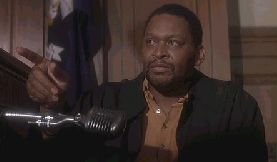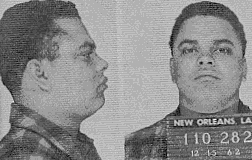The JFK 100
Witness Vernon Bundy

Walter Breaux as Vernon Bundy

Walter Breaux as Vernon Bundy
Bundy testified that one morning in June 1963, while preparing to shoot up in a relatively secluded area off the beach at Lake Pontchartrain, he saw a black limousine pull up, from which a man he identified as Clay Shaw emerged. A "man with a towel" approached from the direction of the beach, and this man Bundy identified as Lee Harvey Oswald. According to Bundy, Shaw handed Oswald what appeared to be money, the two men spoke for five or ten minutes, then both departed. Bundy claimed that Oswald left behind several yellow leaflets that read "Help Cuba" or "Free Cuba," and that the other man had a slight limp, as did Shaw -- the result of an injury received during World War II.(1)
On the witness stand, Shaw denied knowing Lee Oswald, denied ever having seen Vernon Bundy prior to Bundy's testimony at the preliminary hearing of March 1967, denied ever having given money to Oswald, and denied ever meeting anyone by the sea wall at Lake Pontchartrain, as Bundy described.(2)
On its face, Bundy's story defies logic. He testified that he continued his preparations to shoot up despite his concern that the man he identified as Clay Shaw was a narcotics officer,(3) and despite the fact that the man he described kept looking over at him.(4)
Bundy's original statement to the DA's office, however, recently unearthed from the files of New Orleans District Attorney Jim Garrison (portrayed in JFK by Kevin Costner), tells a different story.
In his original statement, the man Bundy later identified as Oswald was called "Pete" and appeared to longtime heroin addict Bundy to be "a real junkie." The Cuba fliers are absent from this statement,(5) and Bundy did not mention the "limp" until after surreptitiously observing Clay Shaw in the presence of Garrison's men.(6)

Vernon Bundy
Jim Garrison denied that Vernon Bundy was receiving any special treatment from the DA's office in exchange for his testimony. Garrison claimed that Bundy's background was of no importance. Bundy, claimed Garrison, was in prison voluntarily, having turned himself in for narcotics treatment on March 4, 1967.(7) Bundy stated the exact same thing, under oath, at Shaw's hearing.
Vernon Bundy and Jim Garrison were lying.
Vernon Bundy did not turn himself in voluntarily on March 4, 1967. Vernon Bundy was arrested on March 4, 1967, by the New Orleans Police Department, and charged with violating parole. (Bundy had pleaded guilty to theft charges on May 25, 1966, and had been placed on probation for five years.)(8) Bundy's probation was revoked and he was sentenced to a year in prison, a sentence that ended suddenly following his appearance at the Shaw preliminary hearing; Bundy was quietly released from jail.
Bundy was arrested again on January 8, 1968, for armed robbery. His rap sheet states that the New Orleans District Attorney declined to file charges.
"The question is," Garrison said, in a filmed interview with NBC, "is he [Bundy] telling the truth or not? There are many attorneys who are brilliant liars and there are dope addicts who have never learned to lie. And that's the case here. The question is, was he telling the truth, and the answer is, obviously."(9)
Again, Jim Garrison was lying.
In March, Garrison had assigned James Kruebbe to administer a polygraph examination to Bundy. Kruebbe's analysis was that Bundy was lying. NOPD polygraph operator Edward O'Donnell, was present when Kruebbe reported this to Garrison and Assistant DA Charles Ward. Ward assured Kruebbe that Bundy would not be used as a witness, but Garrison overruled him.(10)
"We didn't tell him what to say," Garrison declared. "Let the jury decide whether or not he's telling the truth."(11)
In 1971, Jim Garrison was asked under oath by Judge Herbert Christenberry if he had said this. Garrison refused to answer.(12)
In his infamous 1967 Playboy interview, Jim Garrison denied that either Vernon Bundy or star witness Perry Raymond Russo had failed a polygraph test. Garrison even denied under oath that Russo had failed such a test, when actually, he had failed two.
When several of Garrison's men tried one last time to convince their boss to reject Bundy as a witness, Garrison cut them off. Polygraph operator Edward O'Donnell was there, and vividly recalls the way Garrison expressed his opinion. "I don't care if he is lying or not," the DA told his men, "We are going to use him."(13)
"I'll never forget those words," O'Donnell says.(14)
NOTES:1. Patricia Lambert, False Witness (New York: M. Evans and Co., 1998), pp. 99-101; James Kirkwood, American Grotesque (New York: Harper Perennial, 1970), pp. 224-29.
2. Transcript, State of Louisiana v. Clay Shaw, hereafter Shaw, February 27, 1969, (2047) p. 19.
3. James Kirkwood, American Grotesque (New York: Harper Perennial, 1970), p. 224.
4. James Kirkwood, American Grotesque (New York: Harper Perennial, 1970), p. 225.
5. Gerald Posner, Case Closed (New York: Random House, 1993), p. 441; Lambert, p. 101 fn.
6. Bill Davy, "Case Distorted: Posner, Connick, and the New York Times," Probe, March-April, 1996, Vol. 3, No. 3.
7. NBC White Paper, "The JFK Conspiracy: The Case of Jim Garrison," broadcast June 19, 1967.
8. James Kirkwood, American Grotesque (New York: Harper, 1992), p. 226.
9. NBC White Paper, "The JFK Conspiracy: The Case of Jim Garrison," broadcast June 19, 1967.
10. Patricia Lambert, False Witness (New York: M. Evans & Co., 1998), p. 100.
11. Patricia Lambert, False Witness (New York: M. Evans & Co., 1998), pp. 100, 116, 202.
12. Patricia Lambert, False Witness (New York: M. Evans & Co., 1998), p. 202.
13. Time Machine: False Witness, History Channel documentary, 2000; Lambert, p. 202.
14. Time Machine: False Witness, History Channel documentary, 2000.